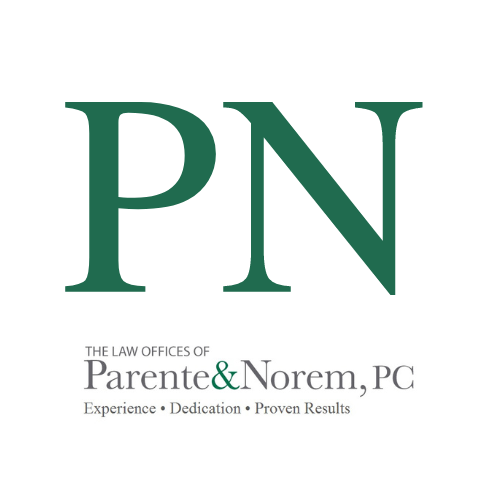
P&B BLOG | Thanksgiving 2024 Road Travel Forecast
This Thanksgiving, the U.S. is set to experience record-breaking travel numbers, with an estimated 79.9 million people journeying 50 miles or more between November 26 and December 2. Of these, 71.7 million will travel by car, marking a 1.8% increase over last year. Here’s what you need to know if you’re hitting the road:
Busiest Travel Days
- Tuesday, November 26 and Wednesday, November 27 are predicted to be the most congested days. The worst times to travel are in the afternoon (1 PM to 7 PM), as commuters mix with holiday travelers.
- If possible, plan to drive during off-peak hours: before 10 AM on these days or on Thanksgiving morning itself, when traffic tends to be light.
Regional Traffic Insights
- The Chicagoland Area is expected to see the highest amount of congestion along its main arteries and interstate highways, especially I90, I94, and I55. Also expect delays around both O’Hare and Midway airports.
- Major cities like New York, Boston, Los Angeles, Seattle, and Washington, D.C., are expected to see traffic levels more than double their usual volume. Routes like I-95 and I-5 could face significant delays.
- Traffic on the Sunday following Thanksgiving will also peak, especially in urban areas as travelers return home.
Tips to Beat the Traffic
- Use navigation apps that factor in real-time traffic conditions.
- Avoid peak travel times: early mornings and late evenings are often the best options for a smoother drive.
- Monitor weather reports, as wet or snowy conditions are forecasted in some regions, which could worsen delays.
Safety and Preparedness
- Check your vehicle for road readiness (tire pressure, fluids, and emergency kits).
- Only use alternate routes you are familiar with.
- Carry snacks, water, and entertainment for longer-than-expected delays.
- Stay updated with local news and traffic advisories.
By planning strategically, you can reduce stress and spend more time enjoying the holiday with family and friends. Stay safe and have a happy Thanksgiving!
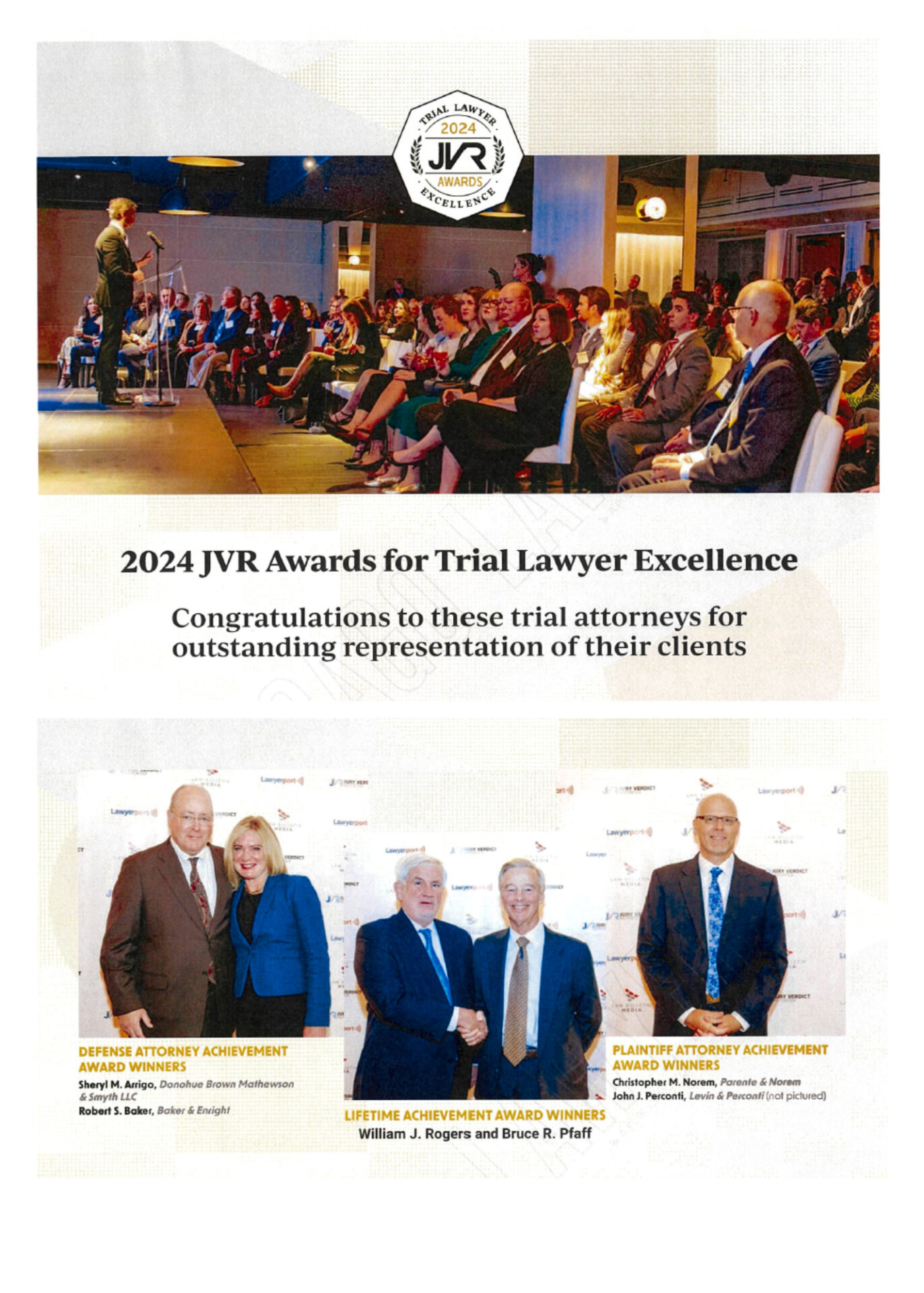
Parente & Norem in the News | Chicago Lawyer Magazine November 2024
The Law Offices of Parente & Norem, P.C. was featured in the latest issue of Chicago Lawyer Magazine. Chris Norem was featured for his Plaintiff Attorney Achievement Award win at the 2024 JVR Awards for Trial Award Excellence. Parente & Norem was also notably ranked 16th out of 112 firms in this issue. To read more, visit Chicago Lawyer Magazine.
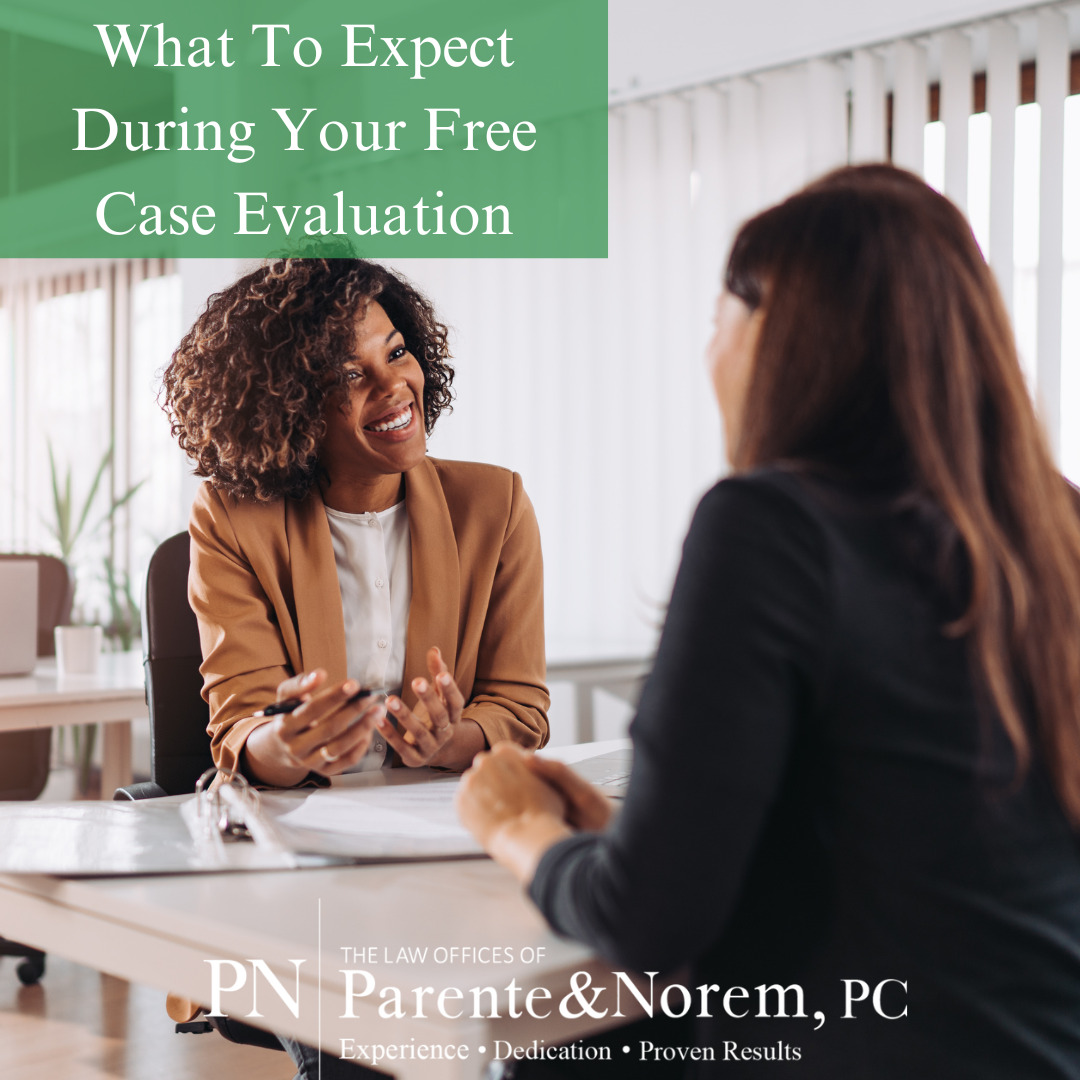
P&N BLOG | What To Expect During Your Free Case Evaluation
When you or someone you know has been injured due to negligence, the thought of hiring a personal injury attorney can be intimidating. At The Law Offices of Parente & Norem, P.C. we want to give you the confidence to reach out if you have any questions and want to see if you have a case to pursue. On today’s blog, let’s walk you through what a free case evaluation looks like at our firm.
Your First Call/Text or Contact Form
Whenever you reach out to Parente & Norem, your information is immediately given to our intake team. Outside of business hours, your contact information will be taken, and someone will reach out to you by the next business day. If it is during business hours, a member of the team will ask you some preliminary questions, and then ask you about the incident that left you injured. It’s important during this call to be as accurate and detailed as possible. You will need specific information like the date of the incident, who was involved, where the incident occurred, what happened, your specific injury and the medical treatment you have received thus far, any available police reports, incident reports, and insurance information. The more detailed and organized you can be before reaching out, the better.
Once your initial intake has been completed, it will be referred to the appropriate attorney based on the type of case it is. That attorney will then review the details that were given during your initial call, and reach out to you again if additional information is needed.
Next Steps
While the goal is always to start building your case immediately, it’s not unusual for some time to pass from your original call to when you are given the next steps. This can be for a myriad of reasons, but usually this is a period of information gathering to make sure our firm is a good fit for your case. During this time, you should continue to note everything going on as well as all of the medical treatment you are receiving.
Determining Whether or Not We Take Your Case
Several factors will contribute to whether or not Parente & Norem accepts your case. First and foremost our firm wants to make sure that we are the optimal attorneys to represent you for the best possible outcome. It is not our intention to pressure you into signing with our firm if it is not a case we can effectively represent.
If we decline to take you on as a client, it isn’t necessarily because you don’t have a case and you should continue your search.
When you’ve been injured, it never hurts to have an attorney look at your case. If you would like your own free case evaluation, call/text The Law Offices of Parente & Norem, P.C. at 312.641.5926 or fill out a free case evaluation form here on our website.
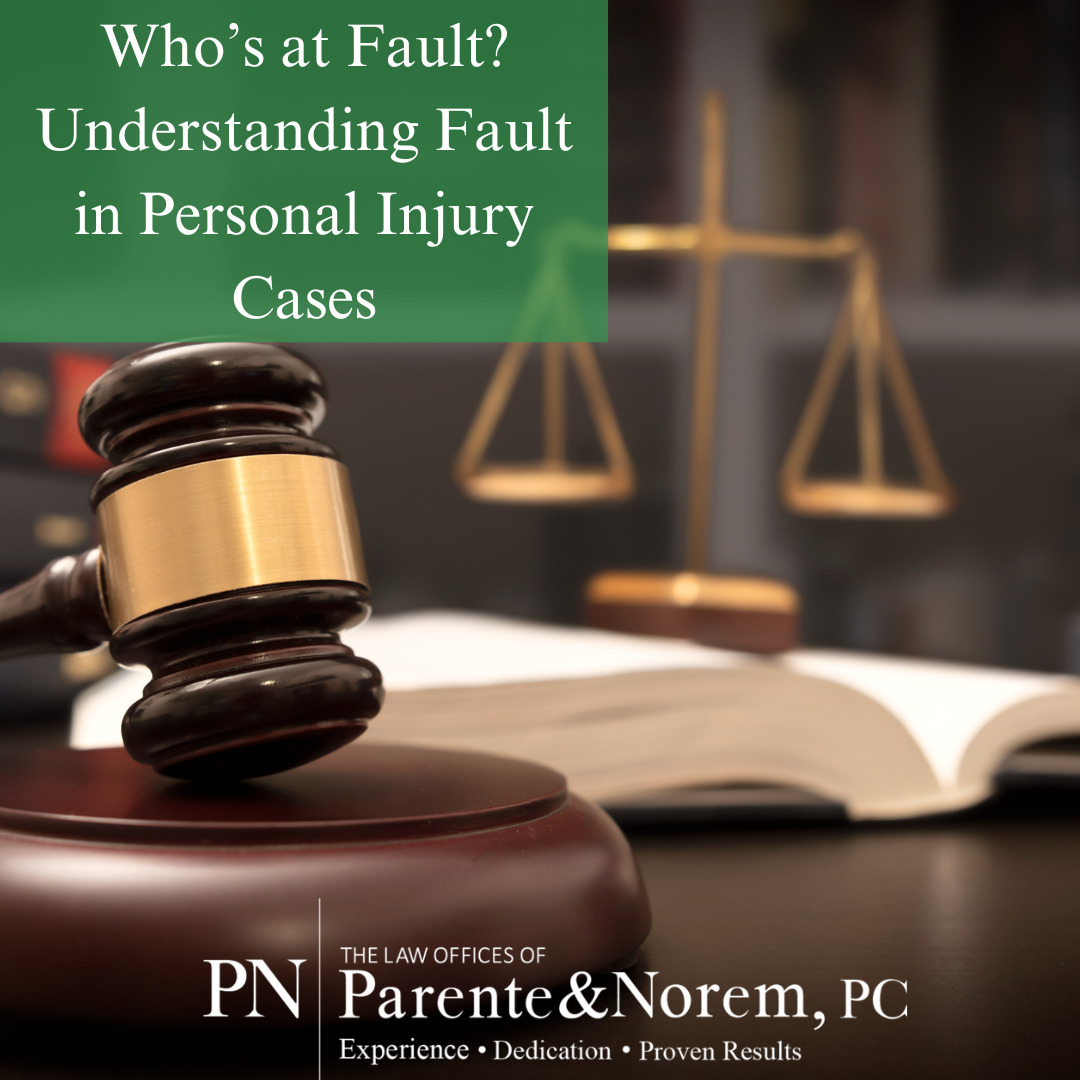
P&N BLOG | Who’s at Fault? Understanding Fault in Personal Injury Cases
When you’re injured due to someone else’s negligence, understanding who is legally at fault is critical for seeking compensation. Determining liability in personal injury cases can be complex, especially when more than one party shares responsibility. Here, we’ll outline the basics of how fault is determined and what factors come into play when multiple parties may be liable.
What is Negligence, and How Does It Relate to Fault?
Negligence is a legal term that refers to a failure to act with the care that a reasonable person would exhibit in similar circumstances. If someone’s negligence directly caused or contributed to your injury, they could be held liable for damages.
To prove negligence, your attorney will need to demonstrate:
Duty of Care: The responsible party owed you a duty of care (e.g., a driver has a duty to follow traffic laws).
Breach of Duty: They breached this duty by acting carelessly or irresponsibly.
Causation: Their actions directly caused your injury.
Damages: You suffered damages (financial, emotional, or physical) due to the injury.
How is Fault Determined in Personal Injury Cases?
Gathering Evidence: Fault determination starts with a thorough investigation of the circumstances leading to the injury. This may involve collecting police reports, witness statements, security footage, or photographs from the scene. Your attorney will use this evidence to paint a picture of how the incident occurred.
Identifying Liable Parties: It’s essential to identify all potentially responsible parties. In some cases, liability is straightforward, such as when a driver runs a red light and causes a collision. But in others, multiple parties may share responsibility; like in multi-vehicle accidents or situations where a property owner and an employee could both be held liable for a slip-and-fall accident.
Expert Witnesses: In some cases, your lawyer may bring in experts to determine fault. For instance, accident reconstruction experts can provide insights into a car accident, while safety experts might testify about proper protocols in a workplace injury.
Reviewing Legal Standards: Each state has specific rules about how fault impacts a personal injury case. For example, some states follow a “comparative negligence” standard, while others use “contributory negligence.” Understanding these legal standards is crucial in determining how much compensation you may be eligible for.
What Happens When Fault is Shared?
In some situations, more than one party may share the blame for an injury. States address shared fault in different ways, typically falling into one of the following categories:
Pure Comparative Negligence: In states with pure comparative negligence, each party is assigned a percentage of fault. You can recover damages even if you’re partially at fault, but your compensation will be reduced based on your level of responsibility. For instance, if you’re 30% at fault, your compensation will be reduced by 30%.
Modified Comparative Negligence: In states with modified comparative negligence, you can only recover damages if you’re less than 50% or 51% at fault, depending on the state. If you are found to be more than halfway responsible, you won’t receive any compensation.
Contributory Negligence: A few states still use contributory negligence, which is the most restrictive. Under this rule, if you are found to be even slightly at fault (even 1%), you cannot recover any compensation.
What to expect during the process of determining fault
The process of determining fault often includes several steps, which may vary depending on the complexity of the case. Here’s what you might expect:
Consultation with an Attorney: A personal injury lawyer will review the facts of your case and advise on your potential for recovery. They can help you understand the specific laws governing fault and your best course of action.
Case Investigation: Your lawyer will gather evidence, speak with witnesses, and work with experts to build a solid case showing the other party’s negligence.
Insurance Negotiations: Your lawyer will communicate with insurance companies to negotiate a fair settlement. Insurance adjusters may try to shift blame to reduce their payout, so having an attorney advocate on your behalf is essential.
Trial, if Necessary: If a fair settlement cannot be reached, your attorney may recommend taking your case to court, where a judge or jury will review the evidence and assign fault.
Why a Personal Injury Lawyer is Essential in Fault Determination
Personal injury lawyers understand the complexities of fault determination and have experience navigating cases where liability is disputed. They can help you maximize your compensation, even if you share some responsibility for the accident. Having a professional by your side ensures that every possible factor is considered, and your rights are protected.
Determining fault in a personal injury case can be complicated, but it’s essential for securing the compensation you need to recover. Whether another driver, a property owner, an employer, or multiple parties are responsible, an experienced personal injury lawyer can guide you through the process. By understanding how fault is shared and the legal standards that apply, you’ll be better equipped to pursue justice and move forward after an injury. If you or someone you know has been injured due to another’s negligence, call/text The Law Offices of Parente & Norem, P.C. today at 312.641.5926 today for a free case evaluation.
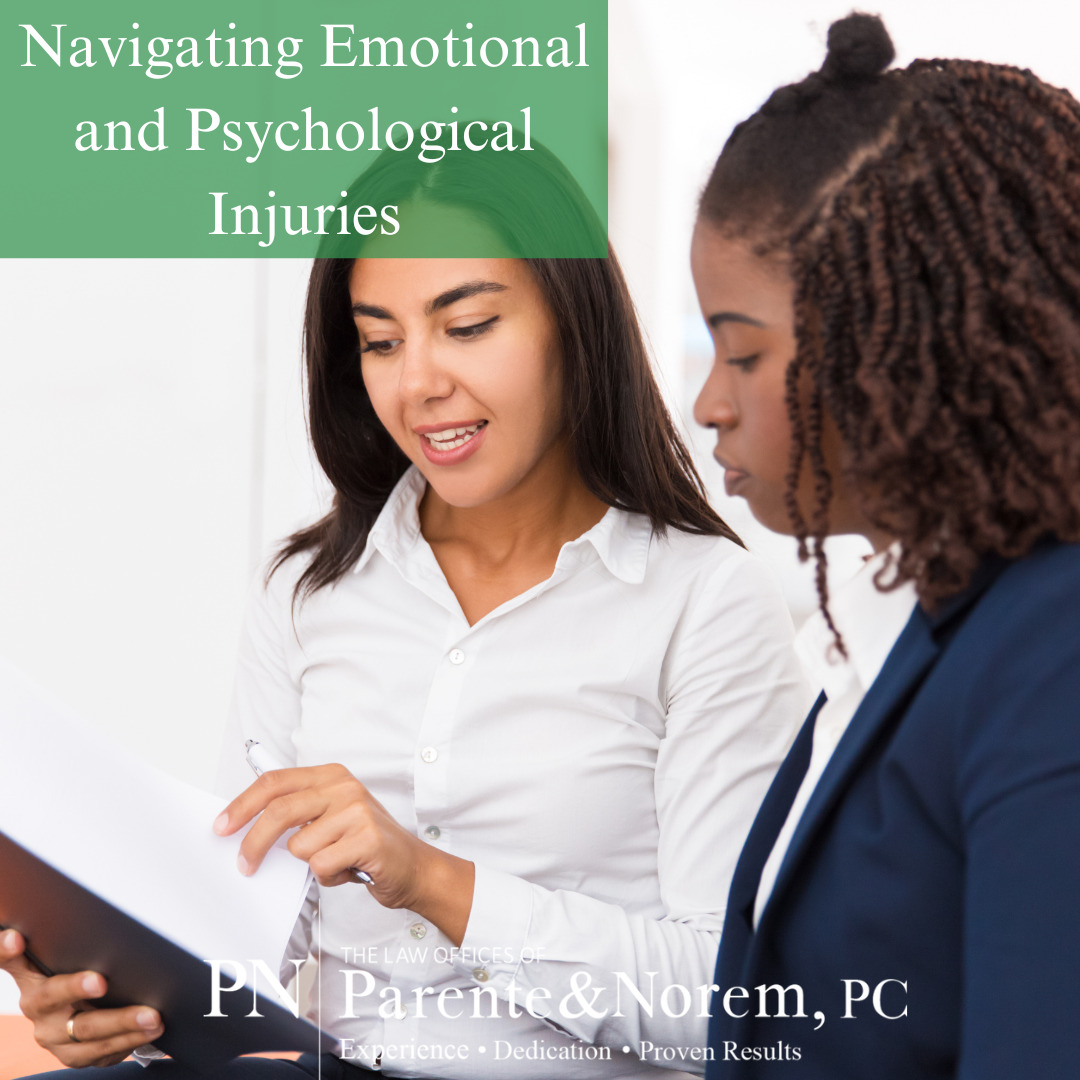
P&N BLOG | Navigating Emotional and Psychological Injuries
When people think of personal injury, physical damage often comes to mind—broken bones, bruises, or surgeries. However, what many don’t realize is that injuries can cut deeper than the physical. Emotional and psychological trauma are often silent but just as impactful. As a personal injury firm, we’re committed to helping our clients recover from all aspects of an injury, not just the visible ones.
Understanding Emotional and Psychological Trauma in Personal Injury Cases
Emotional and psychological injuries refer to the mental and emotional suffering that may follow a traumatic incident. These injuries can stem from any event that disrupts a person’s life, such as a car accident, workplace injury, medical malpractice, or other traumatic situations.
These hidden injuries can manifest in various ways, including:
Anxiety or panic attacks – A once-simple drive to work may now trigger overwhelming fear.
Depression – Feelings of hopelessness and sadness can take over, especially when facing the uncertainty of recovery or the loss of a loved one due to negligence.
Post-Traumatic Stress Disorder (PTSD) – A person may experience flashbacks, nightmares, or heightened anxiety following a traumatic event.
Sleep disturbances – Insomnia or disrupted sleep patterns are common after a traumatic incident.
Emotional instability – Anger, irritability, or emotional outbursts may occur more frequently.
It’s important to note that while a lot of feelings can emerge when you’ve been injured by another’s negligence, hurt feelings or ‘feeling disrespected’ do not qualify as emotional or psychological trauma.
Why Emotional and Psychological Injuries Matter
These hidden injuries can be just as debilitating as physical ones. Imagine trying to heal a broken leg while simultaneously dealing with crippling anxiety about driving or chronic depression. Emotional and psychological trauma can delay or complicate physical recovery, impact relationships, and even make it difficult for a person to return to work.
Ignoring these injuries can leave long-term scars. That’s why it’s essential to address them early and comprehensively. When left untreated, emotional trauma can evolve into chronic conditions that require long-term therapy or medication.
Recognizing Signs of Emotional and Psychological Trauma
As a personal injury client, it’s crucial to recognize the signs of emotional and psychological distress so you can seek the right kind of help. Here are some signs to watch for:
Changes in mood – Persistent feelings of sadness, irritability, or anger that don’t seem to pass.
Withdrawal – A desire to isolate from friends, family, or activities you once enjoyed.
Trouble focusing – Difficulty concentrating on tasks, work, or even conversations.
Hypervigilance – Constantly feeling on edge or overly aware of potential threats.
Physical symptoms – Headaches, stomach issues, and fatigue can often be related to emotional stress.
If you or someone you know is experiencing any of these symptoms following an injury, it’s important to seek help.
Injury recovery is about more than just mending broken bones or healing cuts—it’s about piecing back together your life and sense of well-being. Emotional and psychological injuries can be hidden and hard to talk about, but they are an essential part of your healing process. At The Law Offices of Parente & Norem, P.C., we’re committed to supporting you through the entirety of your recovery, ensuring that all aspects of your injury—physical, emotional, and psychological—are addressed.
If you or someone you love has been injured due to another’s negligence, call/text The Law Offices of Parente & Norem, P.C. at 312.641.5926 today for a free case evaluation.

Matthew Coleman Presents at 2024 ITLA Workers’ Compensation Seminar
On October 25, 2024, The Law Offices of Parente & Norem, P.C.’s head of the work injury department, and partner, Matthew Coleman presented at the 2024 ITLA Workers’ Compensation Seminar at the Hilton Oak Brook Hills Resort in Oak Brook, IL.
Mr. Coleman’s presentation, Doctor Depositions, shared his experience litigating work injury cases throughout the years with unique examples and tools of the trade.
The Illinois Trial Lawyers Association is a statewide organization whose members specialize in representing injured consumers and workers. Founded in 1952, the organization has more than 2,000 members.
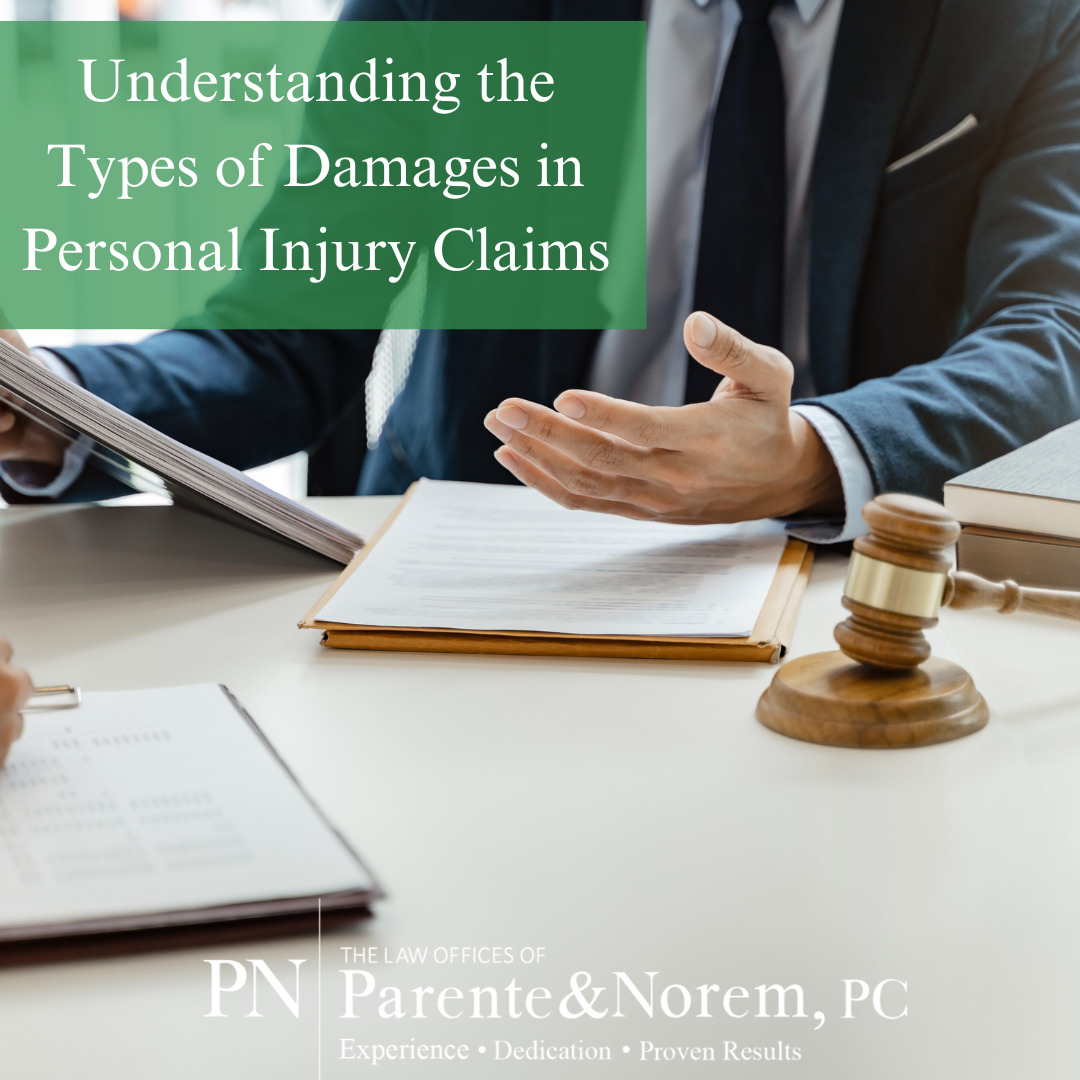
P&N BLOG | Understanding the Types of Damages in Personal Injury Claims
When individuals suffer harm due to accidents or negligence, they may be entitled to compensation through personal injury claims. These claims serve to restore the injured party, as much as possible, to their pre-accident condition by covering financial losses, emotional harm, and other negative impacts caused by the injury. If you’re pursuing a personal injury claim, it’s essential to understand the types of damages you may be entitled to. Below, we’ll explore the three main categories of damages; economic, non-economic, and punitive damages, and what each entails.
Economic Damages
Economic damages are tangible financial losses that result directly from the injury. They are intended to reimburse you for actual expenses and losses you’ve incurred or will incur in the future due to the accident. These damages are usually straightforward to calculate because they are based on documented costs such as bills, invoices, and pay stubs.
Examples of economic damages include:
Medical Expenses – This includes the cost of doctor visits, hospital stays, surgeries, rehabilitation, medications, and ongoing treatment needs. Future medical expenses can also be claimed if your recovery will require long-term care.
Lost Wages – If your injury prevents you from working, either temporarily or permanently, you can recover the income you’ve lost. This also includes future lost earning potential if you are unable to return to your previous occupation or work capacity.
Property Damage – In cases like car accidents, property damage covers the repair or replacement of your vehicle or other personal property involved in the incident.
Other Out-of-Pocket Costs – Expenses like transportation to medical appointments, assistive devices (such as wheelchairs), or home modifications for disability may also be covered.
Non-Economic Damages
While economic damages compensate for tangible losses, non-economic damages address the intangible impacts of an injury. These damages can be harder to quantify since they deal with emotional, psychological, and physical suffering caused by the incident.
Examples of non-economic damages include:
Pain and Suffering – This refers to the physical pain and discomfort endured as a result of the injury.
Emotional Distress – Accidents can leave victims dealing with anxiety, depression, or post-traumatic stress disorder (PTSD). Compensation for emotional distress accounts for these mental health impacts.
Loss of Enjoyment of Life – If the injury prevents you from participating in activities or hobbies you once enjoyed, you may be entitled to compensation for this diminished quality of life.
Loss of Consortium – In some cases, an injury can negatively impact the relationship between spouses or family members. Loss of consortium claims address the loss of companionship, affection, and support within these relationships.
Because non-economic damages are subjective, they often require the involvement of expert witnesses or testimony from therapists, family members, and the injured party to determine an appropriate value.
Punitive Damages
Punitive damages are awarded in cases where the defendant’s actions were particularly reckless, malicious, or intentional. Unlike economic and non-economic damages, punitive damages are not meant to compensate the victim but to punish the wrongdoer and deter similar conduct in the future. These damages are less common and typically only awarded in extreme cases, such as drunk driving accidents or instances of gross negligence.
Punitive damages vary significantly by jurisdiction, and some states place limits or caps on the amount that can be awarded. A skilled personal injury attorney can advise whether your case qualifies for punitive damages based on the specific circumstances.
Why It’s Important to Work with a Personal Injury Attorney
Understanding the types of damages you may be entitled to is critical for maximizing your personal injury claim. Calculating these damages; especially non-economic and punitive damages, can be complex and often requires experienced legal guidance. A personal injury attorney will not only ensure that all applicable damages are identified but also gather the necessary evidence to support your claim, including medical records, expert testimony, and financial documentation.
Additionally, insurance companies often try to settle claims for less than they are worth, particularly when non-economic damages are involved. Having a lawyer by your side helps level the playing field, ensuring you receive fair compensation for your injuries and losses.
If you or a loved one has been injured due to someone else’s negligence, understanding the different types of damages available is crucial for recovering the compensation you deserve. Economic damages cover your out-of-pocket losses, non-economic damages address your emotional and psychological suffering, and punitive damages may apply in extreme cases. An experienced personal injury attorney can evaluate your case, identify all applicable damages, and advocate for your best interests to achieve a fair settlement or court award.
At The Law Offices of Parente & Norem, P.C., we specialize in personal injury cases and are dedicated to helping our clients rebuild their lives after an accident. Contact us today at 312.641.5926 for a free consultation and learn how we can assist you in your pursuit of justice and compensation.

Christopher M. Norem Honored with Fellowship in the International Society of Barristers
The Law Offices of Parente & Norem, P.C. would like to congratulate Christopher M. Norem on his acceptance of Fellowship into the International Society of Barristers.
The International Society of Barristers (ISOB) has a membership of less than 750 lawyers adjudged by their peers and judges to be “outstanding in the field of advocacy,” the Society seeks to honor the role of trial lawyer in our system of justice. One of its principal goals is the preservation of the adversary system and jury trial.
The ISOB was founded in 1965. Its founders conceived the organization to bring together the best of the trial bar in a setting devoid of partisan interests. The Society’s membership consists of Fellows of the Society. As individuals, the Fellows of the Society are committed to the highest of ethical standards and to civility in all their personal and professional relationships. One of the hallmarks of the organization is the inclusion of members’ spouses or significant others as full participants in the activities of the Society.
With a limited membership, the Society has Fellows from every state, the District of Columbia, Puerto Rico, and the Virgin Islands, and from Australia, Canada, England, Scotland, and Ireland, with the great majority from the United States.
No lawyer may apply for membership in the Society. New Fellows are elected by the Society’s Board of Governors on nomination by an existing Fellow and after inquiry as to the nominee’s skill as a trial lawyer and personal and professional integrity directed to other Barristers in the nominee’s region and to judges before whom the nominee has tried cases.
Mr. Norem’s acceptance into the ISOB is a testament to his outstanding advocacy, professionalism, and commitment to justice. It also reflects the high regard in which he is held by his peers and the judiciary. This achievement not only honors Mr. Norem personally but also underscores the caliber of legal representation offered by the Law Offices of Parente & Norem, P.C.
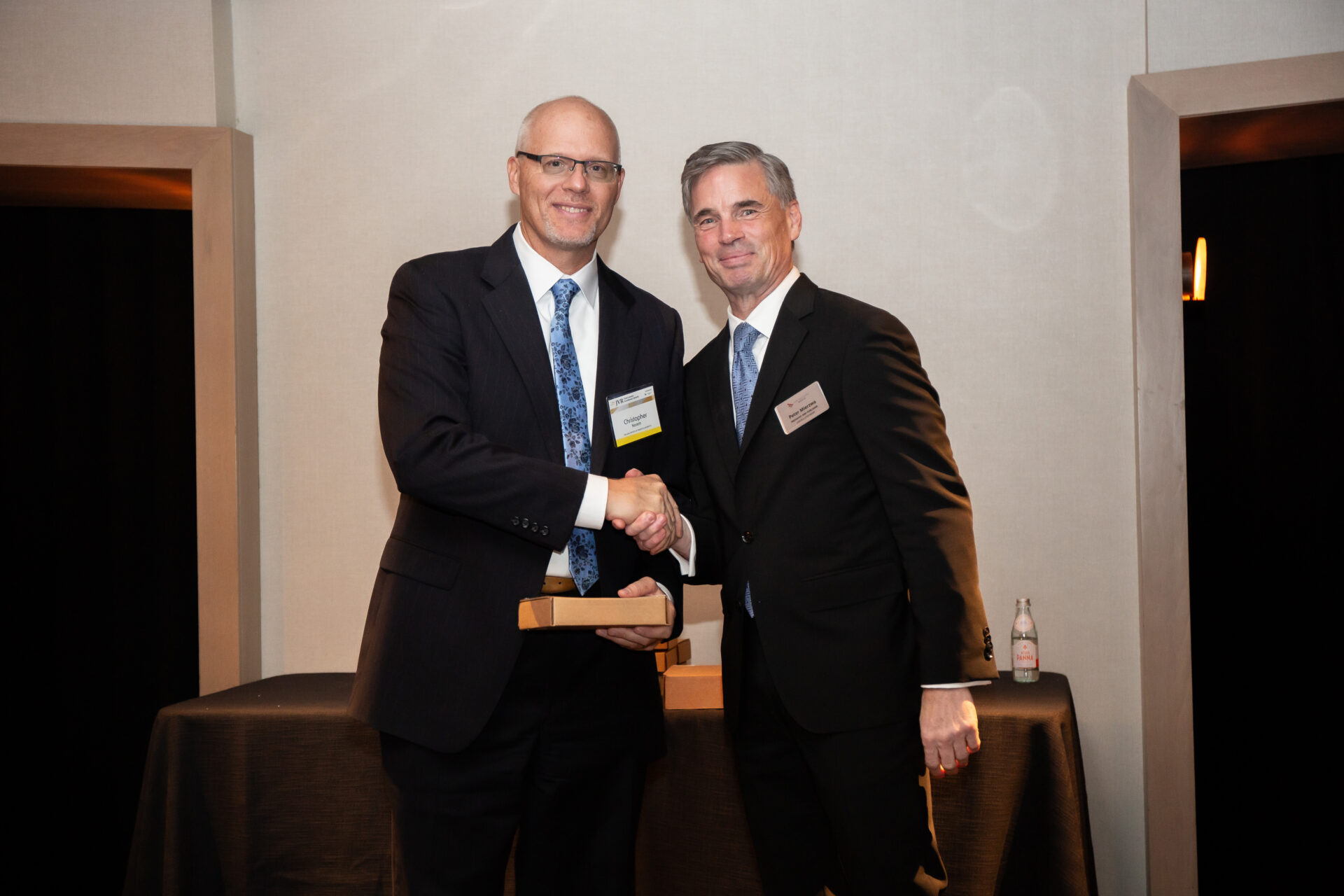
Christopher M. Norem Awarded JVR Plaintiff Attorney Achievement Award
The Law Offices of Parente & Norem, P.C. would like to congratulate Christopher M. Norem on being awarded the JVR Plaintiff Attorney Achievement Award at the JVR Awards on October 16, 2024.
Only a select few lawyers meet the criteria for the prestigious Plaintiff Attorney Achievement Award, making this a true testament to Mr. Norem’s exceptional advocacy, professionalism, and dedication to justice. It also highlights the esteem he holds among his peers. This honor not only celebrates Mr. Norem’s personal accomplishments but also emphasizes the high-quality legal representation provided by The Law Offices of Parente & Norem, P.C.
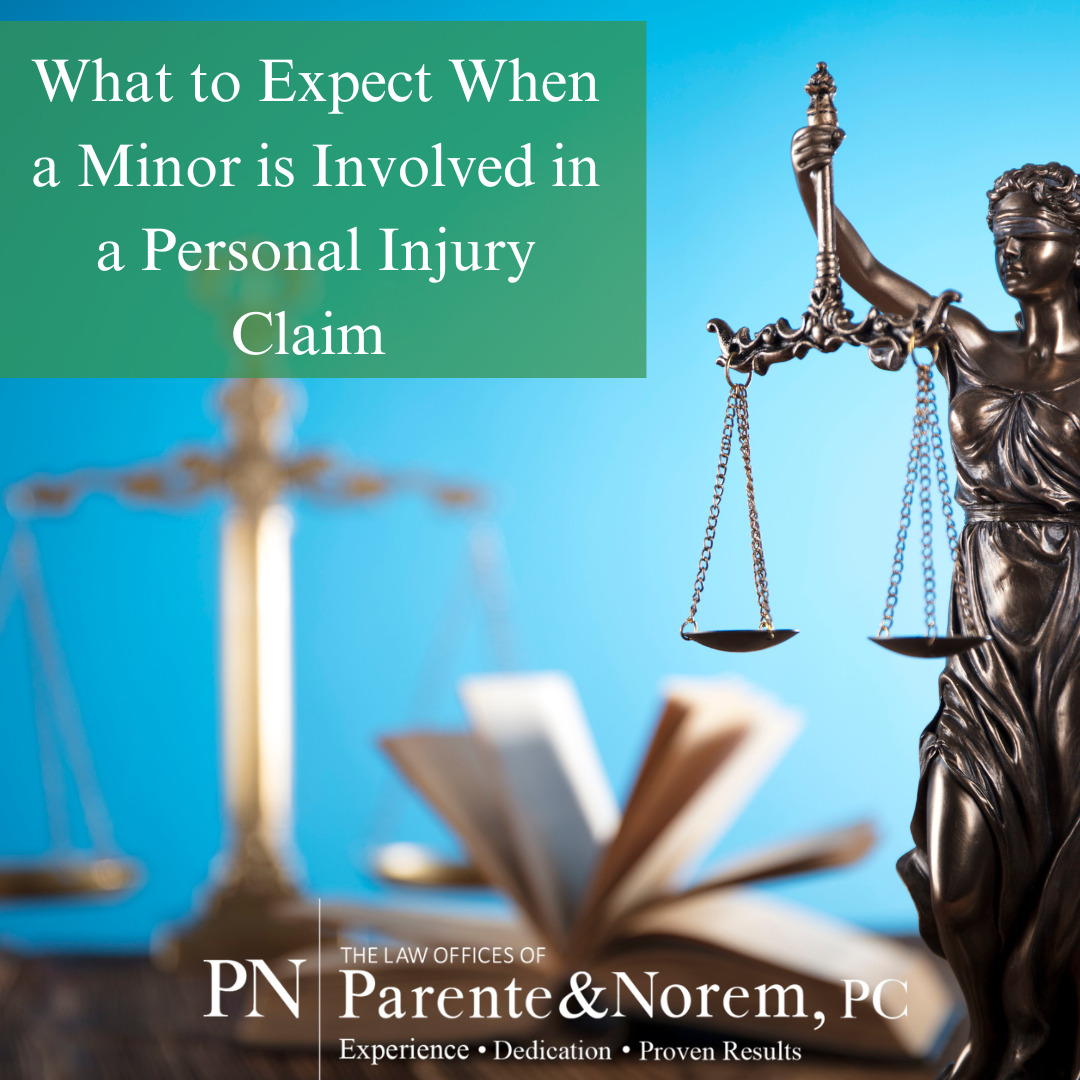
P&N BLOG | What to Expect When a Minor is Involved in a Personal Injury Claim
When a child is injured due to someone else’s negligence, the legal process becomes more complex than a typical personal injury claim. Special rules and protections are in place to ensure that the child’s best interests are considered. Whether the injury involves a car accident, premises liability, or medical malpractice, understanding the legal steps can help families navigate the process with greater confidence. On today’s blog, let’s outline what parents and guardians need to know when filing a personal injury claim involving a minor.
Who Can File the Claim?
Since minors (children under 18) are legally unable to represent themselves in court, a parent or legal guardian must file the personal injury claim on their behalf. In some cases, a guardian ad litem may be appointed to represent the child’s best interests, especially if there is a conflict of interest with the parents, such as a case where a parent may also be liable.
Parents and guardians act as the child’s advocate throughout the legal process. However, any compensation awarded in the case belongs to the child and is intended to cover the costs of the injury, such as medical bills, pain and suffering, and future losses.
Statute of Limitations
The statute of limitations—the time period after the accident when a claim must be filed—often works differently for minors. In many states, the clock does not start until the child turns 18. However, this rule varies depending on the nature of the injury, the type of defendant involved, and the laws of your state. Consulting a personal injury attorney early in the process ensures that important deadlines aren’t missed.
How Compensation is Handled
Any settlement or compensation awarded in a personal injury claim for a minor is carefully monitored by the court to protect the child’s financial interests. In many cases, the court will require the funds to be placed in a trust, structured settlement, or blocked bank account until the child turns 18.
This process ensures that the money is used as intended—to support the child’s needs, such as medical care or education—and is not mismanaged by the parents or others.
What to Expect from Court Involvement
When a minor is involved in a personal injury claim, courts often play a more active role. For settlements, a judge may need to approve the agreement to confirm that it is fair and in the child’s best interest. This step is known as a minor settlement hearing. At this hearing, the judge will review the terms of the settlement, the nature of the injury, and any future care the child may need before giving approval.
Types of Damages Available
In personal injury cases involving minors, damages may include:
Medical Expenses: Current and future medical costs related to the injury.
Pain and Suffering: Compensation for the physical pain and emotional distress the child has endured.
Loss of Future Earnings: If the injury affects the child’s ability to earn a living in the future.
Parental Loss of Income: Some claims may include compensation for a parent’s lost wages if they had to miss work to care for the injured child.
Settling vs. Going to Trial
In most personal injury claims involving minors, settlements are preferred. A settlement provides certainty and avoids the risks and emotional toll of a trial. However, the decision to settle or proceed to trial depends on several factors, including the strength of the case, the amount offered, and whether future needs are adequately covered by the settlement amount.
If a settlement is reached, the court’s approval ensures that the agreement is fair to the child. A personal injury attorney will negotiate on behalf of the family, working to secure the best possible outcome for the child’s present and future needs.
Working with a Personal Injury Attorney
Given the complexities of cases involving minors, working with an experienced personal injury attorney is essential. An attorney can guide parents through the legal process, ensuring the child’s rights are protected, and negotiate with insurance companies to secure fair compensation. Attorneys are also familiar with local rules regarding minor settlements and can streamline court procedures.
When a minor is involved in a personal injury claim, the legal process requires additional care to ensure that the child’s long-term well-being is protected. From filing the claim to handling compensation and navigating court involvement, every step must be carefully managed. Consulting a knowledgeable personal injury attorney early on will help families avoid pitfalls and secure the best outcome for the child’s future.
If your child has been injured due to someone else’s negligence, call/text The Law Offices of Parente & Norem, P.C. at 312.641.5926 for a free consultation with one of our experienced personal injury attorneys. We are here to help you every step of the way and ensure that your child receives the care and compensation they deserve.
